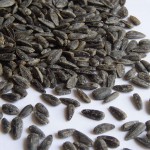 Vitamin E is a fat-soluble vitamin that is an antioxidant and protects our body from free radicals. These free radicals can damage our cells and also cause cardiovascular disease, which is why it can be said that vitamin E is essential to maintaining a healthy heart and protecting against heart disease. As an additional benefit vitamin E is also effective in helping with the immune system.
Vitamin E is a fat-soluble vitamin that is an antioxidant and protects our body from free radicals. These free radicals can damage our cells and also cause cardiovascular disease, which is why it can be said that vitamin E is essential to maintaining a healthy heart and protecting against heart disease. As an additional benefit vitamin E is also effective in helping with the immune system.
Vitamin E is typically measured in milligrams and the recommended daily intakes are as follows:
- Men 19+ years of age = 15mg/daily
- Women 19+ years of age=15mg/daily
- Women who are breastfeeding= 19mg/daily
Check with your health care provider to determine how much vitamin E you need, especially if you are a woman who is expecting. According to a study recently done by the USDA, the intake of vitamin E by women aged 19-50 years was less than 90%, a number that can be improved upon with the following foods:
- 1oz Almonds – 8mg
- 1oz Sunflower oil – 14mg
- 1 tbsp Vegetable oil – 3mg
- 2 tbsp Peanut Butter – 3mg
- ½ Frozen Broccoli – 2mg
- 1 raw Mango – 1mg
In addition to the foods listed above, green leafy vegetables are also a good source, such as spinach. Please note that some foods lose a good amount of their vitamin E content when cooked, processed or even through storage. To help retain the vitamin amount use whole-grain flours and ensure foods are stored in airtight containers.
View the entire vitamin guide:
